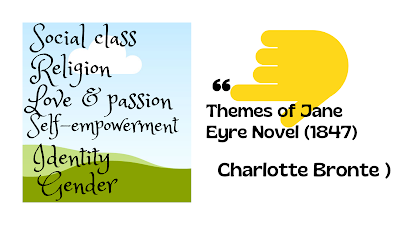Who is Jane Eyre?
Jane Eyre is the protagonist and narrator of the 1847 novel "Jane Eyre" written by English author Charlotte Bronte. The novel tells the story of Jane, an orphan who becomes a governess at the estate of Mr. Rochester, with whom she falls in love. The novel is considered a classic of English literature and is known for its exploration of themes
of social class, religion, and gender roles.
The novel "Jane Eyre" by Charlotte Bronte explores several themes, including:
Social class:
The novel portrays the rigid social classes of the time and the struggle of the protagonist, an orphan who is a member of the lower class, to find acceptance and a sense of belonging.
Religion:
Religion plays a significant role in the novel, with the protagonist's struggles with her faith and her eventual acceptance of a more liberal form of Christianity.
Gender roles:
The novel challenges traditional gender roles of the time by portraying a strong, independent, and intelligent female protagonist who defies societal expectations.
Love and passion:
The novel explores the theme of love and passion through the relationship between Jane and Mr. Rochester, and the struggles they face in pursuit of their love for each other.
Identity:
The novel also explores the theme of identity as Jane struggles to understand and accept her own identity as a poor orphan and a woman in a male-dominated society.
Self-empowerment:
The novel is also seen as an exploration of self-empowerment, as the protagonist's journey is one of self-discovery and self-assertion.







0 Comments